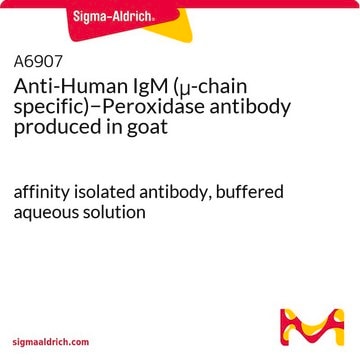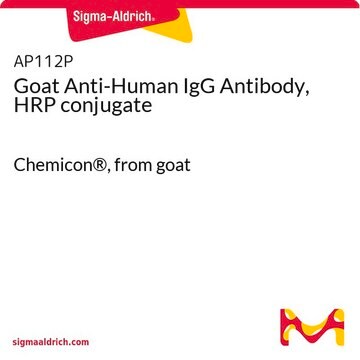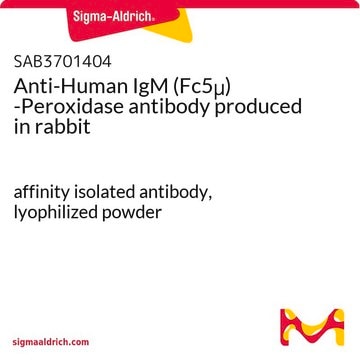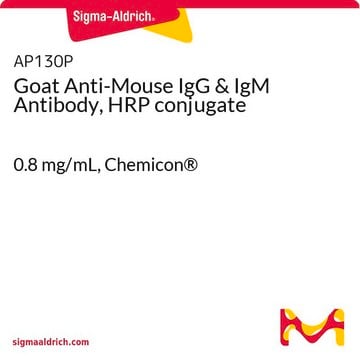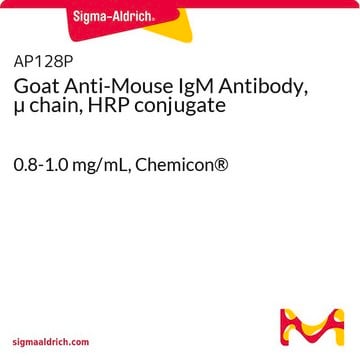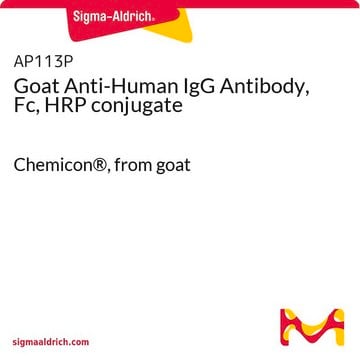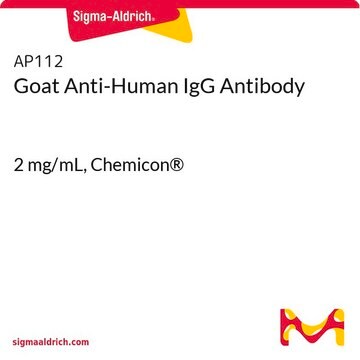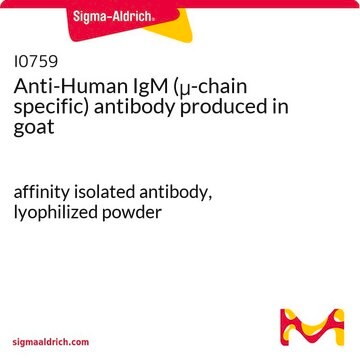AP114P
Goat Anti-Human IgM Antibody, Fc5µ, HRP conjugate
Chemicon®, from goat
Sign Into View Organizational & Contract Pricing
All Photos(1)
About This Item
UNSPSC Code:
12352203
eCl@ss:
32160702
NACRES:
NA.46
Recommended Products
biological source
goat
Quality Level
conjugate
peroxidase conjugate
antibody form
affinity isolated antibody
antibody product type
secondary antibodies
clone
polyclonal
species reactivity
human
manufacturer/tradename
Chemicon®
technique(s)
ELISA: suitable
western blot: suitable
shipped in
wet ice
target post-translational modification
unmodified
General description
IgM constitutes about 10% of serum immunoglobulins. IgM is prominent in early immune responses to most antigens and predominates in certain antibody responses such as ′natural′ blood group antibodies. IgM (with IgD) is the major immunoglobulin expressed on the surface of B cells.
Specificity
Based on immunoelectrophoresis, the antibody reacts with the Fc5μ portion of the human IgM heavy chain. Does not react with human IgG or IgA, or with the light chains of human immunoglobulins. No reactivity against non-immunoglobulin serum proteins, but the antibody may cross-react with IgM from other species.
Immunogen
Prepared from purified human IgM Fc5μ fragment.
Application
EIA: 1:5,000-1:100,000.
Western blots: 1:5,000-1:200,000.
Immunohistochemistry: 1:500-1:5,000.
Optimal working dilutions must be determined by the end user.
Western blots: 1:5,000-1:200,000.
Immunohistochemistry: 1:500-1:5,000.
Optimal working dilutions must be determined by the end user.
Goat anti-Human IgM Antibody, Fc5μ, HRP conjugate is an antibody against Human IgM for use in ELISA & WB.
Research Category
Secondary & Control Antibodies
Secondary & Control Antibodies
Research Sub Category
Fragment Specific Secondary Antibodies
Fragment Specific Secondary Antibodies
Physical form
0.01M Sodium Phosphate, 0.25M NaCl, pH 7.6 with 15mg/mL BSA. Contains no preservative. Lyophilized.
Legal Information
CHEMICON is a registered trademark of Merck KGaA, Darmstadt, Germany
Disclaimer
Unless otherwise stated in our catalog or other company documentation accompanying the product(s), our products are intended for research use only and are not to be used for any other purpose, which includes but is not limited to, unauthorized commercial uses, in vitro diagnostic uses, ex vivo or in vivo therapeutic uses or any type of consumption or application to humans or animals.
Not finding the right product?
Try our Product Selector Tool.
Storage Class Code
13 - Non Combustible Solids
WGK
WGK 3
Flash Point(F)
Not applicable
Flash Point(C)
Not applicable
Certificates of Analysis (COA)
Search for Certificates of Analysis (COA) by entering the products Lot/Batch Number. Lot and Batch Numbers can be found on a product’s label following the words ‘Lot’ or ‘Batch’.
Already Own This Product?
Find documentation for the products that you have recently purchased in the Document Library.
Customers Also Viewed
Lin Sun et al.
Frontiers in bioengineering and biotechnology, 11, 1320586-1320586 (2023-12-21)
Plants are being increasingly recognized for the production of complex human proteins, including monoclonal antibodies (mAbs). Various methods have been applied to boost recombinant expression, with DNA codon usage being an important approach. Here, we transiently expressed three complex human
Krasimir Kostov et al.
Diagnostics (Basel, Switzerland), 11(5) (2021-06-03)
Thickening of the vascular basement membrane (BM) is a fundamental structural change in the small blood vessels in diabetes. Collagen type IV (CIV) is a major component of the BMs, and monitoring the turnover of this protein in type 2
Krasimir Kostov et al.
Medicina (Kaunas, Lithuania), 56(5) (2020-05-15)
Background and objectives: HbA1c measurements may be useful not only in optimizing glycemic control but also as a tool for managing overall vascular risk in patients with diabetes. In the present study, we investigate the clinical significance of HbA1c as
Krasimir Kostov et al.
Pathophysiology : the official journal of the International Society for Pathophysiology, 29(3), 426-434 (2022-08-24)
The increased glycation of elastin is an important factor in vascular changes in diabetes. Using the ELISA method, we determined serum levels of IgM and IgG autoantibodies to advanced glycation end products of vascular elastin (anti-AGE EL IgM and anti-AGE
Sanne Reijm et al.
Arthritis research & therapy, 23(1), 230-230 (2021-09-05)
Anti-modified protein antibodies (AMPA) targeting citrullinated, acetylated and/or carbamylated self-antigens are hallmarks of rheumatoid arthritis (RA). Although AMPA-IgG cross-reactivity to multiple post-translational modifications (PTMs) is evident, it is unknown whether the first responding B cells, expressing IgM, display similar characteristics
Our team of scientists has experience in all areas of research including Life Science, Material Science, Chemical Synthesis, Chromatography, Analytical and many others.
Contact Technical Service